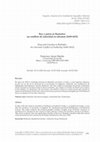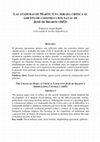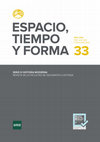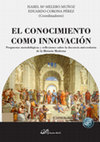Papers by Francisco Amor

Vegueta. Anuario de la Facultad de Geografía e Historia, 2024
En mayo de 1650 la Asamblea General de Barbados proclamó a Carlos ii como legítimo soberano, al c... more En mayo de 1650 la Asamblea General de Barbados proclamó a Carlos ii como legítimo soberano, al cabo de un año de la abolición de la monarquía en Inglaterra. Mediante una combinación de bibliografía especializada y fuentes históricas, este texto analiza la estrategia de presión escalonada, desde sanciones económicas hasta la fuerza marítima, que adoptó el Consejo de Estado para reducir la isla rebelde a la obediencia. De esta forma, este artículo evalúa las consecuencias que entrañó la reducción de Barbados dentro del contexto de las leyes proteccionistas promulgadas por el Parlamento Rump a comienzos de los años cincuenta.
In May 1650, the General Assembly of Barbados proclaimed Charles ii as rightful sovereign, a year after the abolition of monarchy in England. By combining specialized bibliography and historical sources, this paper analyses the pressure-stepped strategy, ranging from economic sanctions to maritime force, adopted by the Council of State aiming to reduce the rebellious island to obedience. This article examines, thus, the implications that the control over Barbados entailed within the context of the protectionist laws enacted by the Rump Parliament in the early 1650s.
Recensión de LANZA GARCÍA, Ramón (coord.), Los dineros de la Corona. Finanzas y cam-bio fiscal en la Monarquía Hispánica (siglos XVI-XVII), Granada, Editorial Comares, 2023, 309pp., ISBN: 978-84-1369-681-2., 2024

Los entramados políticos y sociales en la España moderna, 2023
El presente documento plantea una reflexión sobre los estrechos límites que entorpecieron a media... more El presente documento plantea una reflexión sobre los estrechos límites que entorpecieron a mediados del siglo XVII el desarrollo de un estado fiscal-militar español, en concreto con respecto a la defensa marítima. Aunque la noción de la decadencia española constituya un tópico gastado, es innegable que la Corona de España afrontó para la década de 1640 un rosario de dificultades en sus intentos por recuperar sus exhaustas fuerzas navales, lo que resultó en una posición de relativo debilitamiento dentro de un contexto de rivalidad entre los imperios marítimos europeos. Al situar el foco en la experiencia del constructor y naviero José de Iriarte, el presente texto pretende ejemplificar la ruina que para entonces implicaban tales negocios. Palabras clave: Estado fiscal-militar, guerra naval, asiento de construcción naval galeones.
En torno a la Primera Globalización: circulaciones y conexiones entre el Atlántico y el Mediterráneo (1492-1824), 2022
Ciudades y puertos de Andalucía en un Atlántico global, siglos XVI-XVIII, 2022
Reservados todos los derechos. Ni la totalidad ni parte de este libro puede reproducirse o transm... more Reservados todos los derechos. Ni la totalidad ni parte de este libro puede reproducirse o transmitirse por ningún procedimiento electrónico o mecánico, incluyendo fotocopia, grabación magnética o cualquier almacenamiento de información y sistema de recuperación, sin permiso escrito

Lady Ann y el embajador viajan a Sevilla (primavera de 1664), 2022
Tras el cese al fuego que puso fin a la guerra anglo-española en 1660, ambas monarquías emprendie... more Tras el cese al fuego que puso fin a la guerra anglo-española en 1660, ambas monarquías emprendieron negociaciones para la renovación de los futuros términos de paz. Cuatro años más tarde, a comienzos de 1664, sir Richard Fanshaw era designado por el rey Carlos II para ejercer como embajador en Madrid con el fin de alcanzar un nuevo acuerdo comercial con los españoles en el que los intereses de Inglaterra gozasen de condiciones más ventajosas. El viaje de Fanshaw a través de España comenzó en Cádiz, donde permaneció durante algunos días y se reunió con la comunidad mercantil inglesa allí radicada. El presente texto no pretende sino contextualizar la estancia de Fanshaw en Cádiz, así como el significado de dicha ciudad para los intereses comerciales y geoestratégicos de Inglaterra en el extremo suroccidental de Europa.
After the ceasefire which brought the Anglo-Spanish war to an end in 1660, both monarchies undertook negotiations for the renewal of the future peace terms. Four years later, at the beginning of 1664, Sir Richard Fanshaw was appointed by king Charles II to serve as ambassador in Madrid in order to reach a new trade agreement with Spain in which the English interest enjoyed more advantageous conditions. Fanshaw’s journey through Spain began in Cadiz, where he stayed for a few days and met the English merchant community based there. The present text aims to contextualise Fanshaw’s stay in Cadiz as well as the significance of this city for England’s commercial and geo-strategic interests in the farthest southwest point of Europe.

Matagorda. Revista de Estudios Puertorrealeños, 2021
El siguiente texto tiene como objeto el proporcionar nueva información
acerca del papel que la vi... more El siguiente texto tiene como objeto el proporcionar nueva información
acerca del papel que la villa de Puerto Real jugó como centro de almacenamiento de suministros navales para la provisión de las flotas de Indias. Con este fin nos hemos centrado en la difícil coyuntura bélica que los años 1650 constituyeron para la logística del sistema de flotas, a raíz del desafío militar impuesto por la escuadra inglesa, desplegada frente a Cádiz bajo el mando del general-at-sea Robert Blake. Con esto tratamos de demostrar cómo la villa de Puerto Real fue adquiriendo mayor peso en la infraestructura portuaria de la bahía de Cádiz a mediados del siglo XVII.
The following text aims to provide new information about the role that the town of Puerto Real played as a storage centre of naval supplies for the provision of the West Indies fleets. To this purpose, we have focused on the severe wartime that the 1650s constituted for the logistics of the fleet system due to the military challenge posed by the English squadron deployed off Cadiz under general-at-sea Robert Blake's command. In doing so, we intend to demonstrate how the town of Puerto Real was increasingly acquiring a more significant weight within the port infrastructure of the mid-seventeenth century Bay of Cadiz.
Ciudades atlánticas del sur de España. La construcción de un mundo nuevo (siglos XVI XVIII) , 2021
Grabado francés del siglo XVIII. La presente edición esta financiada con cargo al proyecto de I+D... more Grabado francés del siglo XVIII. La presente edición esta financiada con cargo al proyecto de I+D+i "La construcción de un mundo nuevo: circuitos económicos, dinámicas sociales y mediadores culturales, siglos XVI-XVIII" (HAR2017-85305-P). Reservados todos los derechos. Ni la totalidad ni parte de este libro puede reproducirse o transmitirse por ningún procedimiento electrónico o mecánico, incluyendo fotocopia, grabación magnética o cualquier almacenamiento de información y sistema de recuperación, sin permiso escrito

Espacio, Tiempo y Forma. Serie IV Historia Moderna, 2020
Spanish: José de Carvajal y Zenón de Somodevilla emergieron como los principales artífices de la ... more Spanish: José de Carvajal y Zenón de Somodevilla emergieron como los principales artífices de la política exterior española en una extraña coyuntura internacional. En 1748 las cancillerías de todo el continente emprendieron negociaciones en aras de la paz, ya que las potencias europeas precisaban tiempo para recuperar fuerzas tras tan larga guerra. Fue en semejante contexto en el que los dos ministros desarrollaron su geoestrategia. Pese a sus diferencias, ambos estadistas pretendieron garantizar la posición de España como gran potencia europea, del mismo modo que comprendieron que, en adelante, el equilibrio europeo se vería condicionado por la supremacía marítima y colonial.
English: José de Carvajal and Zenón de Somodevilla emerged as the main architects of Spanish foreign policy amidst the strained international climate of the mid-eighteenth century. In 1748, foreign affairs offices across Europe engaged in conversations surrounding peace as they sought time to regain strength after such a long war. It was within the context of this nascent alliance system that Carvajal and Somodevilla developed their geo-political strategy. In spite of their differences, both statesmen tried to guarantee Spain’s position as a major European power and understood that, going forward, European political balance would be determined by colonial and maritime supremacy.

Hacer Historia Moderna. Líneas actuales y futuras de investigación, 2020
Spanish: En 1655 estalló una nueva guerra entre España e Inglaterra como consecuencia de las riva... more Spanish: En 1655 estalló una nueva guerra entre España e Inglaterra como consecuencia de las rivalidades comerciales y coloniales existentes entre estos dos imperios atlántico. Tan pronto como Oliver Cromwell ordenó el ataque a las colonias españolas en el Caribe, otra potente escuadra, dirigida por el almirante Robert Blake, fue designada para el Golfo de Cádiz, no sólo para bloquear esa ciudad e interrumpir el tráfico marítimo entre España y las Indias, sino también con el objeto de frustrar cualquier asistencia económica o militar allí destinada. El siguiente texto apuesta por una aproximación a un acontecimiento histórico prácticamente olvidado por los historiadores: la rápida y resuelta reacción de las autoridades locales españolas al bloqueo naval inglés del verano de 1655. Particularmente se centra en la contribución aportada por el comercio andaluz para financiar una bien pertrechada escuadra capaz de enfrentarse en el mar a los ingleses, así como de proteger la flota del tesoro.
English: In 1655 a new Anglo-Spanish War broke out as a consequence of the existent commercial and colonial rivalries between these two Atlantic Empires. No sooner had Oliver Cromwell ordered the attack on the Spanish colonies in the Caribbean than another powerful squadron, led by General-at-Sea Robert Blake, was commissioned for the Gulf of Cadiz not only to cruise off that city and hold up the marine traffic between Spain and the West Indies but also with the objective of thwarting either economic or military assistance bound thither. The following text advocates for an approach to a historical event practically forgotten by the historians: that of the Spanish local authorities resolutely and hastily reacting to the English naval blockade in the summer of 1655. It particularly focuses on the economic contribution made by the Andalusian traders in order to fund a well-equipped defensive squadron capable of beating the English at sea as well as protecting the plate fleet.
On October 12th, 1748, the naval combat of Havana, which was the last action of the
War of Jenki... more On October 12th, 1748, the naval combat of Havana, which was the last action of the
War of Jenkins’ Ear, took place. Despite being a colonial war between two maritime empires, this was the only naval engagement occurred in American waters. In this battle the British squadron, led by the Rear-Admiral Sir Charles Knowles, fought against the Spanish one, under Andrés Reggio’s command. Thereby, this was the only occasion in which it was possible to evaluate the efficiency of Spanish Navy after decades of naval rearmament.
The War of the Spanish Succession had left the Spanish naval power weakened. So the governments h... more The War of the Spanish Succession had left the Spanish naval power weakened. So the governments had to create a unified and modern navy: the Royal Navy. Within a century, the revaluation of the Atlantic space needed more than ever a naval force, able to protect the overseas empire and play a dissuassive role. These circumstances implied that the Navy transmitted a modern science which had not been established in Spain up to then.
Drafts by Francisco Amor
1 ¿Quién, pues? Si los pobres por el hecho de ser más se reparten los bienes de los ricos, ¿no es... more 1 ¿Quién, pues? Si los pobres por el hecho de ser más se reparten los bienes de los ricos, ¿no es eso injusto? -¡Por Zeus, lo estimó justo el poder soberano!-Entonces, ¿a qué hay que llamar la suprema injusticia? O de otro modo, si tomamos toda la población y los más se reparten los bienes de los menos, es evidente que destruyen la ciudad 1 .
Talks by Francisco Amor
La presencia naval neerlandesa en Cádiz en una época de transición (1648-1660), 2021
La suspensión de las flotas de Indias en el año 1655, 2020
La construcción de un mundo nuevo: circuitos económicos, dinámicas sociales y mediadores cultural... more La construcción de un mundo nuevo: circuitos económicos, dinámicas sociales y mediadores culturales en las ciudades atlánticas del sur de España, siglos XVI-XVIII (I).
Teaching Documents by Francisco Amor

El conocimiento como innovación. Propuestas metodológicas y reflexiones sobre la docencia universitaria de la Historia Moderna, 2024
No está permitida la reproducción total o parcial de este libro, ni su incorporación a un sistema... more No está permitida la reproducción total o parcial de este libro, ni su incorporación a un sistema informático, ni su transmisión en cualquier forma o por cualquier medio, sea este electrónico, mecánico, por fotocopia, por grabación u otros métodos, sin el permiso previo y por escrito del editor. La infracción de los derechos mencionados puede ser constitutiva de delito contra la propiedad intelectual (art. 270 y siguientes del Código Penal). Diríjase a Cedro (Centro Español de Derechos Reprográficos) si necesita fotocopiar o escanear algún fragmento de esta obra. Puede contactar con Cedro a través de la web www.conlicencia.com o por teléfono en el 917021970/932720407. Esta publicación es parte del proyecto de I+D+i PID2022-138444OB-I00, financiado por el MICIU/










Uploads
Papers by Francisco Amor
In May 1650, the General Assembly of Barbados proclaimed Charles ii as rightful sovereign, a year after the abolition of monarchy in England. By combining specialized bibliography and historical sources, this paper analyses the pressure-stepped strategy, ranging from economic sanctions to maritime force, adopted by the Council of State aiming to reduce the rebellious island to obedience. This article examines, thus, the implications that the control over Barbados entailed within the context of the protectionist laws enacted by the Rump Parliament in the early 1650s.
After the ceasefire which brought the Anglo-Spanish war to an end in 1660, both monarchies undertook negotiations for the renewal of the future peace terms. Four years later, at the beginning of 1664, Sir Richard Fanshaw was appointed by king Charles II to serve as ambassador in Madrid in order to reach a new trade agreement with Spain in which the English interest enjoyed more advantageous conditions. Fanshaw’s journey through Spain began in Cadiz, where he stayed for a few days and met the English merchant community based there. The present text aims to contextualise Fanshaw’s stay in Cadiz as well as the significance of this city for England’s commercial and geo-strategic interests in the farthest southwest point of Europe.
acerca del papel que la villa de Puerto Real jugó como centro de almacenamiento de suministros navales para la provisión de las flotas de Indias. Con este fin nos hemos centrado en la difícil coyuntura bélica que los años 1650 constituyeron para la logística del sistema de flotas, a raíz del desafío militar impuesto por la escuadra inglesa, desplegada frente a Cádiz bajo el mando del general-at-sea Robert Blake. Con esto tratamos de demostrar cómo la villa de Puerto Real fue adquiriendo mayor peso en la infraestructura portuaria de la bahía de Cádiz a mediados del siglo XVII.
The following text aims to provide new information about the role that the town of Puerto Real played as a storage centre of naval supplies for the provision of the West Indies fleets. To this purpose, we have focused on the severe wartime that the 1650s constituted for the logistics of the fleet system due to the military challenge posed by the English squadron deployed off Cadiz under general-at-sea Robert Blake's command. In doing so, we intend to demonstrate how the town of Puerto Real was increasingly acquiring a more significant weight within the port infrastructure of the mid-seventeenth century Bay of Cadiz.
English: José de Carvajal and Zenón de Somodevilla emerged as the main architects of Spanish foreign policy amidst the strained international climate of the mid-eighteenth century. In 1748, foreign affairs offices across Europe engaged in conversations surrounding peace as they sought time to regain strength after such a long war. It was within the context of this nascent alliance system that Carvajal and Somodevilla developed their geo-political strategy. In spite of their differences, both statesmen tried to guarantee Spain’s position as a major European power and understood that, going forward, European political balance would be determined by colonial and maritime supremacy.
English: In 1655 a new Anglo-Spanish War broke out as a consequence of the existent commercial and colonial rivalries between these two Atlantic Empires. No sooner had Oliver Cromwell ordered the attack on the Spanish colonies in the Caribbean than another powerful squadron, led by General-at-Sea Robert Blake, was commissioned for the Gulf of Cadiz not only to cruise off that city and hold up the marine traffic between Spain and the West Indies but also with the objective of thwarting either economic or military assistance bound thither. The following text advocates for an approach to a historical event practically forgotten by the historians: that of the Spanish local authorities resolutely and hastily reacting to the English naval blockade in the summer of 1655. It particularly focuses on the economic contribution made by the Andalusian traders in order to fund a well-equipped defensive squadron capable of beating the English at sea as well as protecting the plate fleet.
War of Jenkins’ Ear, took place. Despite being a colonial war between two maritime empires, this was the only naval engagement occurred in American waters. In this battle the British squadron, led by the Rear-Admiral Sir Charles Knowles, fought against the Spanish one, under Andrés Reggio’s command. Thereby, this was the only occasion in which it was possible to evaluate the efficiency of Spanish Navy after decades of naval rearmament.
Drafts by Francisco Amor
Talks by Francisco Amor
Teaching Documents by Francisco Amor
In May 1650, the General Assembly of Barbados proclaimed Charles ii as rightful sovereign, a year after the abolition of monarchy in England. By combining specialized bibliography and historical sources, this paper analyses the pressure-stepped strategy, ranging from economic sanctions to maritime force, adopted by the Council of State aiming to reduce the rebellious island to obedience. This article examines, thus, the implications that the control over Barbados entailed within the context of the protectionist laws enacted by the Rump Parliament in the early 1650s.
After the ceasefire which brought the Anglo-Spanish war to an end in 1660, both monarchies undertook negotiations for the renewal of the future peace terms. Four years later, at the beginning of 1664, Sir Richard Fanshaw was appointed by king Charles II to serve as ambassador in Madrid in order to reach a new trade agreement with Spain in which the English interest enjoyed more advantageous conditions. Fanshaw’s journey through Spain began in Cadiz, where he stayed for a few days and met the English merchant community based there. The present text aims to contextualise Fanshaw’s stay in Cadiz as well as the significance of this city for England’s commercial and geo-strategic interests in the farthest southwest point of Europe.
acerca del papel que la villa de Puerto Real jugó como centro de almacenamiento de suministros navales para la provisión de las flotas de Indias. Con este fin nos hemos centrado en la difícil coyuntura bélica que los años 1650 constituyeron para la logística del sistema de flotas, a raíz del desafío militar impuesto por la escuadra inglesa, desplegada frente a Cádiz bajo el mando del general-at-sea Robert Blake. Con esto tratamos de demostrar cómo la villa de Puerto Real fue adquiriendo mayor peso en la infraestructura portuaria de la bahía de Cádiz a mediados del siglo XVII.
The following text aims to provide new information about the role that the town of Puerto Real played as a storage centre of naval supplies for the provision of the West Indies fleets. To this purpose, we have focused on the severe wartime that the 1650s constituted for the logistics of the fleet system due to the military challenge posed by the English squadron deployed off Cadiz under general-at-sea Robert Blake's command. In doing so, we intend to demonstrate how the town of Puerto Real was increasingly acquiring a more significant weight within the port infrastructure of the mid-seventeenth century Bay of Cadiz.
English: José de Carvajal and Zenón de Somodevilla emerged as the main architects of Spanish foreign policy amidst the strained international climate of the mid-eighteenth century. In 1748, foreign affairs offices across Europe engaged in conversations surrounding peace as they sought time to regain strength after such a long war. It was within the context of this nascent alliance system that Carvajal and Somodevilla developed their geo-political strategy. In spite of their differences, both statesmen tried to guarantee Spain’s position as a major European power and understood that, going forward, European political balance would be determined by colonial and maritime supremacy.
English: In 1655 a new Anglo-Spanish War broke out as a consequence of the existent commercial and colonial rivalries between these two Atlantic Empires. No sooner had Oliver Cromwell ordered the attack on the Spanish colonies in the Caribbean than another powerful squadron, led by General-at-Sea Robert Blake, was commissioned for the Gulf of Cadiz not only to cruise off that city and hold up the marine traffic between Spain and the West Indies but also with the objective of thwarting either economic or military assistance bound thither. The following text advocates for an approach to a historical event practically forgotten by the historians: that of the Spanish local authorities resolutely and hastily reacting to the English naval blockade in the summer of 1655. It particularly focuses on the economic contribution made by the Andalusian traders in order to fund a well-equipped defensive squadron capable of beating the English at sea as well as protecting the plate fleet.
War of Jenkins’ Ear, took place. Despite being a colonial war between two maritime empires, this was the only naval engagement occurred in American waters. In this battle the British squadron, led by the Rear-Admiral Sir Charles Knowles, fought against the Spanish one, under Andrés Reggio’s command. Thereby, this was the only occasion in which it was possible to evaluate the efficiency of Spanish Navy after decades of naval rearmament.